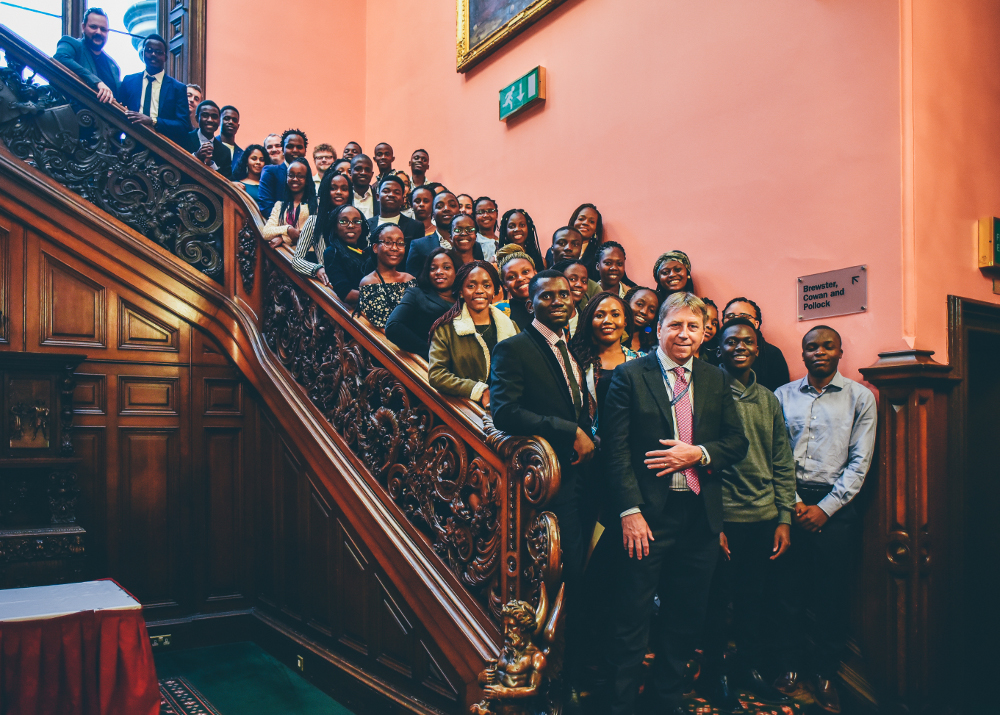
In this post, Pete Kingsley, the Student Development Coordinator on the Mastercard Foundation Scholars Program, describes how the Reflective Coaching scheme is helping support African Mastercard Scholars during their time here at the University of Edinburgh…
Over the next seven years, and beginning in 2016, the Mastercard Foundation is supporting 200 African students with full scholarships to study undergraduate and postgraduate degrees at the University of Edinburgh. How can we make sure these students thrive here? And, for that matter, what can we learn from them that might help us support students more widely, not least the group of over 800 Africans studying at the University?
One of the big successes in our support for the Mastercard Scholars so far has been a scheme called Reflection Coaching. In essence, this is a form of one-to-one mentoring in which each Scholar is paired with a University staff member. Mentoring and coaching is at the heart of many learning relationships, so what is distinctive about the Reflection Coaching scheme?
The basics
Each year, we recruit staff volunteers as coaches who are willing to help out scholars. They are given initial and ongoing training, and paired with a first year undergraduate scholar on a one-to-one basis. Some coaches express preferences about the coachees – for instance, interest in a particular African country or language – but most are simply paired randomly. The coaches then meet with their students once a month during their first year in Edinburgh.

Although we have some academics serving as coaches, most are professional services staff, covering a wide range of roles and seniorities. The professional services emphasis helps: the coaching relationship is not an academic one. Nor is it a place for advice intended to supplement the counselling service or Student Association. Instead, the coaching sessions are a place to have a wider conversation in which scholars reflect and plan. We ask the coaches to pose, in their own words, three questions each month: what has gone well since we last met, what have been the challenges, and what would you like do differently in the next month?
Experiences
Although our scholars come from a wide variety of secondary schools, their prior experiences are often in hierarchical, formal learning environments. As such, an open-ended, discursive conversation with a (perceived) authority figure takes some getting used to. Nonetheless, our scholars tend to get used to the format quickly, and evaluate the scheme very highly. Reflecting systematically on one’s experiences, strengths and prospects allows for a wide ranging, challenging conversation, and encourages a form of personal development that is rarely possible through the personal tutor system.
Equally important are the benefits for the coaches. We hope the conversations themselves are stimulating and a chance to develop mentoring skills, perhaps especially for staff who predominantly work behind the scenes of our ongoing academic drama. Most importantly, from our point of view, our scholars are our ambassadors within the University. Through this scheme, colleagues throughout the University develop a fuller understanding of what it is to be an African student. It is a chance for the coaches, also, to reflect – how can we all, whether a systems-focussed administrator or a senior manager, help make the University a place where students of all backgrounds can thrive? And, frankly, the coaches become a very helpful roster of contacts if we need help solving an unrelated problem in the future!

An evolving scheme
Now in its third year, we’ve made mistakes and tried to learn from them. Initially, members of the Mastercard team itself acted as some of the coaches, and we asked coaches to fill in a form detailing issues that came up in each conversation. In both cases, these were well-meant ways of getting to know our Scholars better that inadvertently introduced an element of surveillance into the relationship which inhibited some discussions. The current, simpler version of the scheme respects the confidentiality of this relationship, to be broken only in extreme circumstances.
Although some coaches have indicated a willingness to take on a second scholar, in general, we prefer a one-to-one relationship to allow a more personal experience. However, this does create issues in recruiting enough coaches, particularly as our programme reaches its peak years in this, and the next, academic year. For our postgraduates and undergraduates in years 2 and above, we create other opportunities for reflection, often in group settings.
The opposite of a hostile environment
We are profoundly grateful to our Reflection Coaches for their contribution. Although we don’t compensate our coaches – beyond the odd Edinburgh First lunch! – many are kind enough to report that they find the coaching one of the most fulfilling parts of their jobs. In a time when international students express anxiety about their place in the UK, our coaches are able to deliver a very personal form of welcoming support – the very opposite of a hostile environment.
Related blog posts:
Transformative leadership: the MasterCard Foundation Scholars Program
The only true job security: Connecting curricular and extra-curricular activities at university


